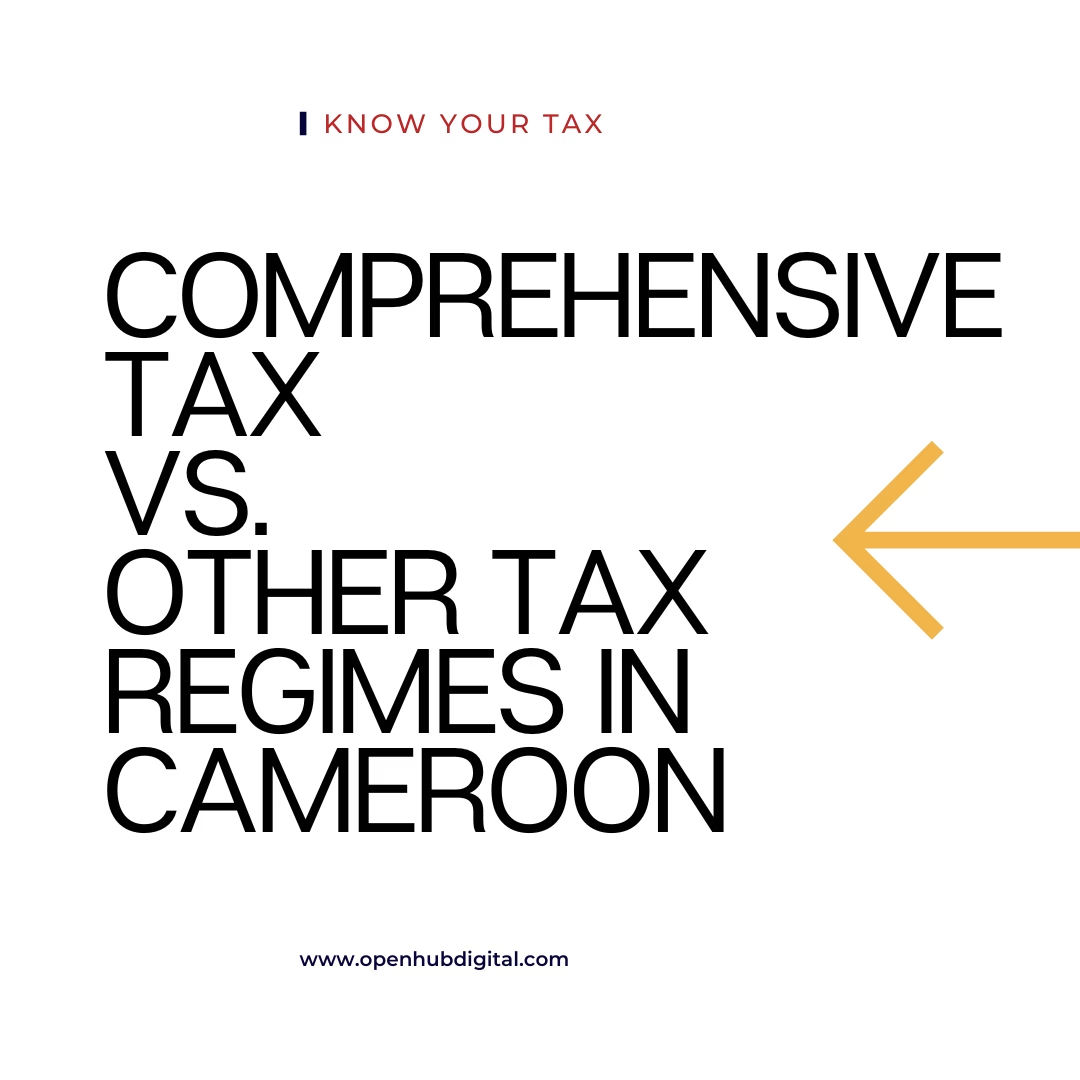Cameroon has different tax systems designed for various types of businesses. The Comprehensive Tax System was introduced to simplify tax obligations for small businesses, merging the Discharge Tax System and the Simplified Tax System into a single framework for those earning below 50 million FCFA. However, other tax regimes still apply to larger businesses or those operating under special conditions.
Understanding the differences between these tax regimes helps businesses choose the best option and stay compliant with tax laws.
What is the Comprehensive Tax System?
The Comprehensive Tax System applies to businesses with turnover below 50 million FCFA. It replaces multiple tax obligations with a single annual payment and covers:
If this article helped you, you can support our work at OpenHub.
Support OpenHub Digital- Business License Tax
- Value-Added Tax (VAT) exemption
- Personal Income Tax (PIT) on Business Profits
This system provides a simplified approach to taxation, reducing administrative burdens for small businesses.
For details on eligibility, check comprehensive-tax-eligibility.
Other Tax Regimes in Cameroon
Aside from the Comprehensive Tax System, Cameroon has the following tax regimes:
1. The Actual Earnings Tax System
This system applies to businesses with a turnover exceeding 50 million FCFA. Key features include:
- Businesses must declare their actual earnings and pay tax based on net profit.
- VAT declarations are required every month.
- Corporate Income Tax (CIT) applies at 25% plus 10% Additional Council Tax (ACT) for businesses with turnover up to 3 billion FCFA, and 33% for those exceeding 3 billion FCFA.
2. The Special Tax Regimes
Some industries, such as oil, mining, and telecom, operate under special tax regimes with different tax structures. These businesses often have sector-specific tax rates and exemptions.
Key Differences Between the Comprehensive Tax System and Other Tax Regimes
| Feature | Comprehensive Tax System | Actual Earnings Tax System | Special Regimes |
|---|---|---|---|
| Turnover Limit | Below 50M FCFA | Above 50M FCFA | Industry-Specific |
| VAT Obligations | No VAT | Monthly VAT Filing | Depends on Industry |
| Tax Calculation | Fixed Annual Tax | Based on Net Profit | Custom Rates |
| Payment Frequency | Quarterly | Monthly | Varies |
| Corporate Tax Rate | N/A | 25% + 10% ACT (≤3B FCFA) / 33% (>3B FCFA) | Varies |
| Accounting Requirements | Simplified | Detailed Records | Advanced |
For tax payment guidance, see quarterly-tax-payments-made-easy.
Which Tax System is Best for Your Business?
✅ Small businesses with turnover below 50M FCFA → Comprehensive tax for ease and reduced paperwork.
✅ Growing businesses exceeding 50M FCFA → Actual earnings tax system for compliance with corporate tax rules.
✅ Industry-specific businesses → Check special tax rules applicable to your sector.
For expert tax advice, visit OpenHub Consulting’s Tax Management Services.
Understanding the right tax system ensures compliance and helps businesses plan finances effectively. Whether under the Comprehensive Tax System or another regime, knowing tax obligations can help businesses avoid penalties and operate smoothly.
For more insights, check:
From Insight to Implementation
Going through the administrative and legal landscape in Cameroon requires more than just information—it requires a grounded local partner. At OpenHub Consulting, we specialize in helping the diaspora and international investors turn their business visions into compliant, operational realities.
If you are ready to move forward, our team is prepared to manage your registration and compliance from start to finish.
Start Your Company Incorporation →Discover more from OpenHub Digital
Subscribe to get the latest posts sent to your email.
If this article helped you, you can support our work at OpenHub.
Support OpenHub Digital
